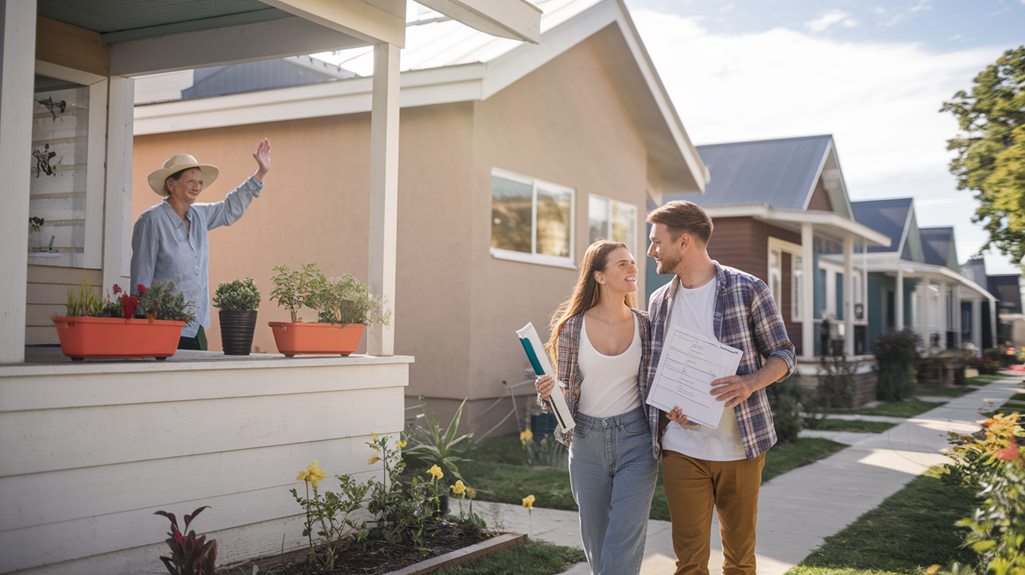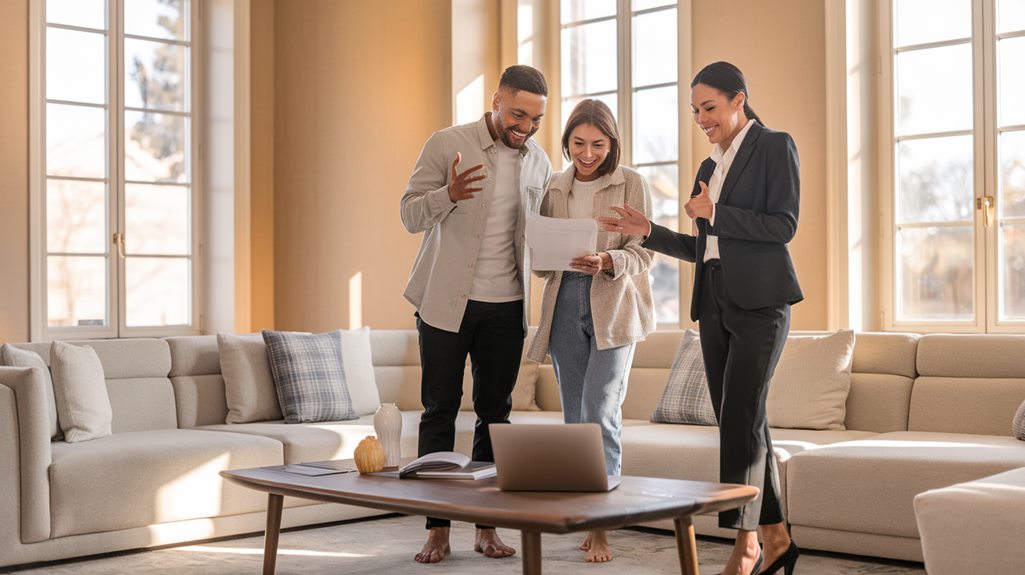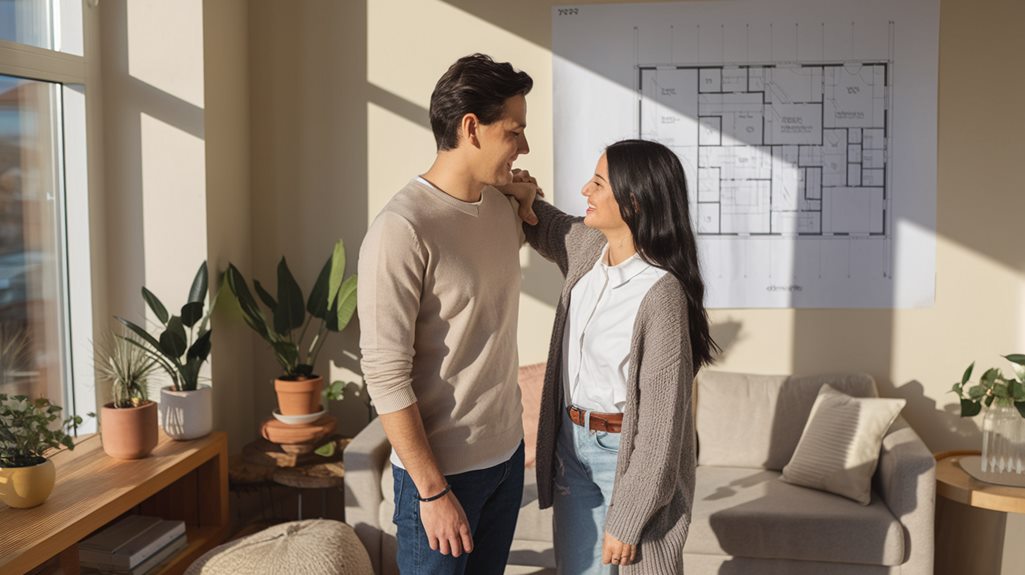Buying your first home can feel scary, but it doesn't have to be! Start by looking at your money situation. Check your credit score and make a budget that includes the down payment and other costs.
It's important to know if you're ready to buy a home. Learn about different types of mortgages, like fixed or adjustable rates, and get pre-approved for a loan.
Next, find a good team to help you. This team can include a real estate agent, a mortgage broker, and a home inspector. They will guide you through the process.
Think about where you want to live, what style of house you like, and what features are important to you.
As you go through these steps, you'll learn more and feel more confident in your choices. Happy home buying!
Ready to start building equity in your own Michigan home? Get your personalized home loan quote today.
Assessing Your Financial Situation

Before you start looking for a home, it's really important to check your money situation. First, look at your credit score. This number is super important because it helps you know if you can get a loan and how much interest you'll pay. A good score can save you a lot of money over time!
Next, make a budget. This will help you get ready for buying a house. Try to save money for a down payment, closing costs, and things you'll need for your new home.
Look at how much money you make and what you spend each month. Find ways to spend less and save more.
This will help you feel better about your money and get you ready to buy a home. Remember, being prepared is very important for making your dream of owning a home come true!
Michigan residents, unlock the door to your new home. Request your home loan quote from Treeside Financial today.
Understanding Mortgage Options
When you're thinking about getting a mortgage, it helps to know what choices you have. A fixed-rate mortgage means your payment stays the same every month. This can make it easier to budget.
An adjustable-rate mortgage might be good if you think interest rates will go down in the future. Government-backed loans can have good terms, especially if you get help with your down payment.
Getting pre-approved for a mortgage can make your offer stronger. This can help you stand out when buying a home.
Think about how long you want to pay off your loan. Some people may want to refinance later, which can change things.
Also, don't forget about mortgage insurance. This can add to your monthly payments.
You might be closer to buying your home than you think
Take our 2-minute home buyer readiness quiz to see how prepared you really are – no credit check required.

Lastly, knowing about the closing process will help you prepare for this big step in buying a home.
Building a Home Buying Team

If you're thinking about buying a home, it's important to get a good team together to help you. Start with a real estate agent. They know a lot about homes and can help you find the right one.
Next, talk to a mortgage broker. They'll help you figure out how to pay for your new home.
A home inspector is also very important. They'll check the house to make sure there are no big problems. You want to know if the house is safe and in good shape.
Title companies help with the legal stuff when you buy a home, so you don't have to worry.
Don't forget about a financial advisor. They can help you plan your money for buying a home. You should also have an insurance agent to protect your new home and belongings.
If you're moving to a new area, a relocation specialist can help you get used to your new neighborhood.
You might want to add an interior designer and a contractor to your team too. They can help you make your new home look just the way you want and fix anything that needs work.
It's a good idea to think about getting a home warranty. This can help cover costs for unexpected repairs.
Determining Your Home Needs
When you're getting ready to buy a home, it's really important to think about what you need. This will help you find a place that fits your life and dreams.
Start by making a list of things that are most important to you. Do you want a home office? Or maybe a big backyard to play in?
Think about how you live every day and what you might want in the future. To make this easier, think about these three things:
- Space Needs: How many bedrooms and bathrooms do you need to feel comfy?
- Location: How close do you want to be to work, schools, or fun activities?
- Style: Do you like modern, old-fashioned, or mixed styles for your home?
Taking time to think about these will help you find the perfect home!
Exploring Neighborhoods

When you look at neighborhoods, it's important to check out the local places around you.
Make sure there are good schools nearby for your kids. Good schools can help your kids learn and can also make your home worth more money later.
It's also smart to look at crime rates. You want to live in a safe place where you and your family can feel happy and secure.
Assessing Local Amenities
When you're thinking about buying a home, it's important to look at the local amenities in the neighborhood. These are things that make your life easier and more fun.
Think about how close the bus or train is, where you can shop, and places to play or relax.
Imagine living in a place where you can easily see a doctor, join fun community events, and try yummy food at local restaurants. Good parks and fun things to do nearby can make your day better.
Here are some things to check out:
- How close is public transportation? This helps you get around easily.
- Are there different places to eat? This makes eating out exciting.
- Are there parks and places to play? This helps you stay healthy and active.
Evaluating School Districts
When picking the right home, it's important to look at the nearby schools, even if you don't have kids. Good schools can make homes worth more money and help build a nice community.
Start by checking how schools are rated and what the students are like. Look at the fun activities kids can join, as they make school more exciting. Find out if the teachers are well-trained and how well the students are doing in their classes.
Safety is key, so look at how safe the schools are and how kids get to school. Talk to parents to hear their thoughts and see how involved the community is.
Lastly, think about any changes that might happen in the future that could affect the schools. Doing all this will help you make a smart choice and find a friendly place to live.
Analyzing Crime Rates
When you think about moving to a new neighborhood, it's really important to check out the crime rates. This helps you know how safe the area is for you and your family.
Keeping your family safe is a big deal, so looking into safety can help you make a good choice about where to live.
Here are some simple things you can do to learn about crime rates:
- Look at local crime reports. These can show you what's been happening lately and in the past.
- Talk to local police officers. They can tell you about safety in the area and what they do to keep it safe.
- Visit the neighborhood at different times. Walk around and see what it feels like. This way, you can see if it seems like a good place for you and your family.
Taking these steps can help you feel good about your new home!
Navigating the Home Search
Finding your first home can feel like an exciting adventure! To make this journey easier, you can use some smart tips. Start by learning about different neighborhoods. Check how much homes cost in those areas. Look at online listings and take virtual tours to see which houses you like the most.
When you go to see homes, remember to be polite and follow the rules of visiting. It's important to make a good impression!
Working with a friendly real estate agent can also help a lot. They can give you helpful advice and help you find what you want.
Think about what you need in a home so it feels just right for you. Don't forget to act quickly if you find a home you love, especially when many people are looking.
Using these tips can help you find a home that's just perfect for you!
Making an Offer

Making an offer on a home is very important. You want your offer to stand out from the rest. Here are some simple steps to help you make a great offer:
- Look at Similar Homes: Check how much other homes like the one you want have sold for. This will help you know what's a fair price.
- Write a Personal Note: Share why you love the house. Tell the seller what makes it special to you. This can help them feel connected to you.
- Show You Are Ready to Buy: Include a letter from your bank that says you can afford the home. This will make the seller trust you more.
The Home Inspection Process
After you make a good offer on a house, your next step is to get a home inspection. This is very important when buying a home. It helps you know that your new house is in good shape.
A home inspector will check many things, like the roof, plumbing, and electrical systems. They use a checklist to find problems that might make you rethink your choice.
Here's a simple list of what they check and some common issues:
| What They Check | Common Problems |
|---|---|
| Roof | Leaks and damage |
| Plumbing | Pipe leaks |
| Electrical Systems | Bad wiring |
| Foundation | Cracks |
| HVAC Systems | Not working well |
Getting a home inspection gives you important information. It helps you feel safe and happy about your new home. Don't forget to do this step—it helps you make smart choices!
Understanding Closing Costs

When you buy a home, it's important to know about closing costs. These are extra fees you have to pay when you finish buying the house.
Some common costs include paying for an appraisal, title insurance, and origination fees. Each of these costs helps make sure the sale goes smoothly.
If you talk with the people involved, you might be able to lower some of these costs. This can help you save money and feel better about your new home.
Breakdown of Common Fees
Buying your first home can be exciting, but it can also come with some extra costs that might surprise you. Knowing about these costs is really important so you can be ready.
Here are some common fees you might see:
- Inspection costs: These help you check if the home is in good shape. It's like a check-up for a house!
- Lender fees and appraisal costs: These tell you how much your loan will be and help make sure the home's price is fair.
- Title insurance: This helps protect you from problems with who owns the house.
Also, remember that moving costs can add up fast.
You might want to think about getting a home warranty for extra safety.
Negotiating Closing Expenses
When you buy a home, there are many fees you need to know about. It's important to talk and negotiate about closing costs because this can help you save money. You can ask the sellers to pay some of these costs or ask the lender to give you a credit.
Make sure to look at what different lenders offer so you can find the best deal. Learn about all the fees you might see, and ask if there are any ways to get discounts or waivers.
Saving money on these costs can make it easier for you. Plus, it helps you feel smart about your money choices. Remember, every dollar you save helps you feel better about your big investment in a home!
Finalizing Your Purchase
Getting ready to buy your new home is super exciting! This is the time when all your hard work comes together.
First, you need to do a final check of the house. Walk through each room to make sure everything looks good and matches what you agreed on. This step is really important to catch any last-minute problems.
Next, you'll have some papers to sign. There will be a lot of important documents like the deed and mortgage agreement. Take your time to read everything carefully. If you don't understand something, it's okay to ask questions. This will help you feel good about your choice and make you a part of your new neighborhood.
Here are some tips to remember:
- Do a final check of the house to see if it looks good.
- Read all the papers closely.
- Ask questions if anything is confusing.








